by [email protected] | Oct 27, 2021 | Prescriptions for your Practice
Podcast: Play in new window | Download
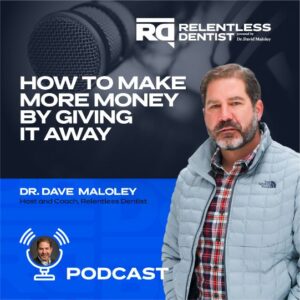 Statistically, 91% of consumers say they will switch to a brand that supports a good cause given similar price and quality.
Statistically, 91% of consumers say they will switch to a brand that supports a good cause given similar price and quality.
Back when I was still active with my dental practice in Vail, I created the “Monthly Give,” wherein we give a portion of the collection to our chosen nonprofit organization every month. We started in 2012 with a 1.2% allocation for charity and slowly ratcheted it up every year as our profit grew bigger and bigger. How can we be generous with giving as we grow?
In today’s episode, I’ll talk about cause marketing — how it works, how your organization can get involved, and how it can benefit your team, your organization, your patients, and the community you are serving. Then, I’ll share steps to successfully create a cause marketing drive and address the objections to spotlighting your philanthropy. Finally, an anecdote from one of our patients clearly shows how impactful generosity is as it creates a powerful domino effect.
Tune in and find solutions to common practice issues at Prescriptions for Your Practice.
Key Quotes:
- “There are more benefits in cause marketing than just writing checks and knowing that they will help people’s lives easier and better.”
- “In each monthly meeting, a time is dedicated to nominating the next nonprofit partner.”
- “There should be a priority system that needs to be built out.”
- “This is not giving back. Giving back assumes you took something. This is just generosity. This is just giving.”
- “The more you grow, the more you get to give.”
- “There’s no one that doesn’t benefit from a good cause marketing.”
Featured on the Show:


by [email protected] | Oct 20, 2021 | Prescriptions for your Practice
Podcast: Play in new window | Download
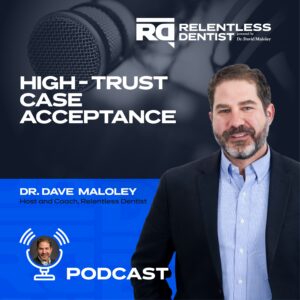 What are we doing to ensure that we’re not presenting treatment in a skeptical environment and inadvertently generating negative marketing for ourselves and our businesses?
What are we doing to ensure that we’re not presenting treatment in a skeptical environment and inadvertently generating negative marketing for ourselves and our businesses?
Research shows that 55% of all communication is in the body language, 38% is in the tone of voice, and 7% is in the actual words spoken — all of which make up the overall impression we give out to our patients.
The way your patients perceive your practice impacts every decision and action they take. This perception has a rippling effect on your confidence, staff, potential customers, and business security.
In today’s episode, I’ll share with you two contrasting personal stories on what enthusing client is and what it’s not. Then, I have some tips that you can train your team on to ensure you’re generating high-trust case acceptance in your practice. I’ll also talk about the importance of picking up non-verbal and social cues to reciprocate appropriate responses.
Tune in and find solutions to common practice issues at Prescriptions for Your Practice.
Key Quotes:
- “If we don’t do our practice in a trusting environment, it can generate buyer’s remorse and resentment if something goes wrong.”
- “Too often, we hang too much on what our patients are telling us, and sometimes they are not candid.”
- “We have to make sure that we’re picking up on the tone of voice and body language before we’re really satisfied that this person is scheduled for the next phase of treatment.”
- “If we don’t read their body language, we can inadvertently scare and confuse the patient.”
- “The possibility is that we appreciate that body language doesn’t lie.”
- “The goal that we must establish and the intent that we should have is that every patient all day long is seen, heard, and felt like we’ve let them know that they matter to us.”
- “You should look for a long-term relationship because it pays dividends again and again and again.”
- “Your team is your eyes, ears, and spokespeople, so they must be good as you are, if not better.”
Featured on the Show:


by Karah Karah | Oct 13, 2021 | Prescriptions for your Practice
Podcast: Play in new window | Download
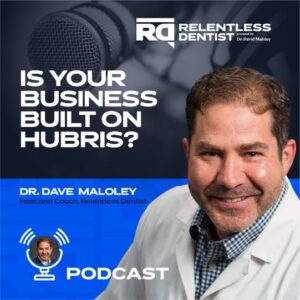 “Honour may not win power, but it wins respect. And respect earns power.” — Ishida Mitsunari
“Honour may not win power, but it wins respect. And respect earns power.” — Ishida Mitsunari
Apparently, even though a large number of dental practice owners believe that team success is essential, they also admit that only 1 to 2 members of the team are effective — a brutal truth that most practice owners have to face. Every business aims to foster an atmosphere that brings out the best in everyone because it will translate into a positive experience for both the team and the patients. The big question is, how do you transform your team’s hubristic culture into a team-centric mindset.
In today’s episode, I’ll talk about the factors that drive an honor business and a hubris business, and why it is important to know where your practice stands between the two. I’ll also share the five elements that I want you to examine about your business. I prepared insightful questions that you need to contemplate to set yourself up for an excellent 2022.
Tune in and find solutions to common practice issues at Prescriptions for Your Practice.
Key Quotes:
- “The more divided our society gets, the harder it is to align a team.”
- “If we’re going to be a growing organization, we have to challenge our comfort zone.”
- “Environment is everything. A big part of being a good CEO is helping the team see the vision, you’re continuously selling that vision, but you also have to give them the tools and the training to succeed.”
- “Collective confidence: When people come to work each day, they believe that this team will be successful no matter what.”
- “If you’re willing to do what other dental practice owners won’t do, you will reap the benefits.”
Featured on the Show:
- I appreciate your feedback. Let me know what you learned and loved here: [email protected].


by [email protected] | Oct 6, 2021 | Prescriptions for your Practice
Podcast: Play in new window | Download
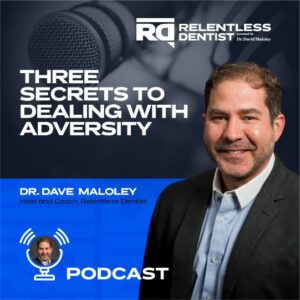 What’s your favorite movie of all time?
What’s your favorite movie of all time?
I can greatly identify with the Rocky series’ story of resilience and perseverance, both onscreen and the underlying story on how Sylvester Stallone fought all adversity to have the movie get its screen time. It’s been my go-to movie whenever I’m confronted with roadblocks.
All of us went through one of the worst times last year, and it has tested our character and faith. But, it has also been a period of discovery that we’re far stronger than we thought we were.
In today’s episode, I’ll be talking about resilience. The difficulty we face as practice owners have exponentiated to a great degree in these crazy times. I’ll share three ways to keep a proactive stance on resiliency in dealing with adversity, rise above the occasion, and get back up better and stronger.
Tune in and find solutions to common practice issues at Prescriptions for Your Practice.
Key Quotes:
- “Make sure that you’re setting 90-day goals that bring out the best in you and your team.”
- “In being resilient, we can see opportunities in these radical shifts. You have to be aware and stay on offense so you can seize them.”
- “It’s better to be proactive and stay in the offense during turbulent times than to be caught off guard.”
- “Resilient businesses would need resilient cultures, and resilient cultures require resilient leaders.”
- “Sometimes positive thinking will keep us in denial of what is. We can face the brutal facts; we can look at the reality of what is and still be hopeful.”
- “In difficult times, we have to stay purpose-driven.”
- “Adaptability, mental agility is a hallmark of resilience.”
- “There are always lessons in deep, dark, difficult times; there are always gems to be mined.”
- “Sometimes in business and life, we have to color outside the lines and do whatever is required.”
Featured on the Show:


by [email protected] | Sep 29, 2021 | Prescriptions for your Practice
Podcast: Play in new window | Download
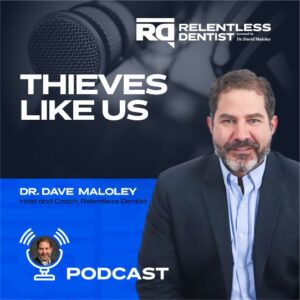 5% of people are hard-wired for integrity, while 5% are hard-wired to lie, cheat, and steal even if it doesn’t benefit them. Interestingly, 90% of people will lie, cheat, and steal given three things. Listen in to find out.
5% of people are hard-wired for integrity, while 5% are hard-wired to lie, cheat, and steal even if it doesn’t benefit them. Interestingly, 90% of people will lie, cheat, and steal given three things. Listen in to find out.
We always attribute “stealing” to something tangible, not realizing that there are some abstract constructs that directly affect the practice’s finances.
In this episode, I will discuss the three things that make 90% of people subscribe to some degree of misgiving, why assessing character is complex, and what you can do about it. I will also share my insights on how you can differentiate the strong character from the weak and thoroughly assess your potential hire’s personality before introducing them into your culture.
Tune in and find solutions to common practice issues at Prescriptions for Your Practice.
Key Quotes:
- “There’s nothing more viable in your practice than your character as a leader and the character of your team.”
- “Money doesn’t have a conscience.”
- “What really exposes our character is difficult circumstances.”
- “Strong character comes from the feeling of security and self-worth.”
- “Weak characters are overcome by the circumstances.”
- “Think about the character in your hiring. Think about this collective character that is not only additive but creates a synergistic effect for better or worse.”
- “Make sure that you’re not too simple in your interview questions.”
- “Your home environment and work environment can bring out the best in you or the worst in you.”
- “We need to have a growth mindset and understand that you can become whoever you want to become.”
- “We all have things that we put in our backpacks as little kids and carry with us into adulthood that don’t serve us, that don’t service our practice, that don’t serve our patients, that don’t serve our team.”
Featured on the Show:


Page 13 of 14« First«...1011121314»  Statistically, 91% of consumers say they will switch to a brand that supports a good cause given similar price and quality.
Statistically, 91% of consumers say they will switch to a brand that supports a good cause given similar price and quality.


 What are we doing to ensure that we’re not presenting treatment in a skeptical environment and inadvertently generating negative marketing for ourselves and our businesses?
What are we doing to ensure that we’re not presenting treatment in a skeptical environment and inadvertently generating negative marketing for ourselves and our businesses? “Honour may not win power, but it wins respect. And respect earns power.” — Ishida Mitsunari
“Honour may not win power, but it wins respect. And respect earns power.” — Ishida Mitsunari What’s your favorite movie of all time?
What’s your favorite movie of all time? 5% of people are hard-wired for integrity, while 5% are hard-wired to lie, cheat, and steal even if it doesn’t benefit them. Interestingly, 90% of people will lie, cheat, and steal given three things. Listen in to find out.
5% of people are hard-wired for integrity, while 5% are hard-wired to lie, cheat, and steal even if it doesn’t benefit them. Interestingly, 90% of people will lie, cheat, and steal given three things. Listen in to find out.